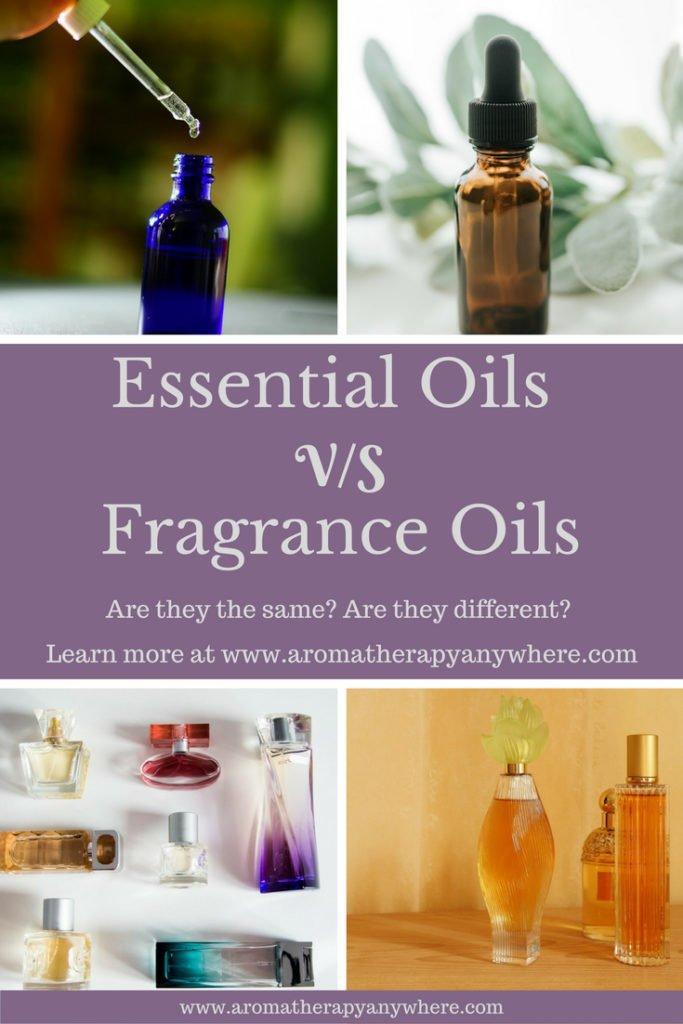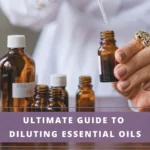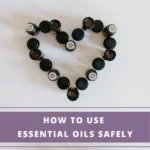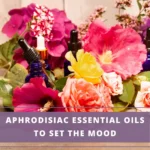As an Amazon Associate I earn from qualifying purchases. See Full Disclosure Here
The terms essential oil and fragrance oil are often used interchangeably but that’s not right. There are a number of important differences between essential oils and fragrance oils.
Although essential oils and fragrance oils are both used to add scents to various products, they differ in their production methods, composition, and benefits.
Here’s a detailed look at the difference between essential oils and fragrance oils:
What are Essential Oils?
Essential oils are natural products that are extracted from different plant parts of various herbs, flowers, and trees.
These plant extracts are rich in natural compounds that give the extract its distinctive therapeutic properties. They can be used to manage several physical and mental health conditions.
Read the detailed explanation of what are essential oils.
What are Fragrance Oils?
Fragrance oils are synthetic products. They are manufactured in laboratories using a combination of chemicals to obtain the desired fragrance.
Laboratory-produced fragrance oils are simply pleasant-smelling compounds. They lack the natural healing properties that essential oils do.
Essential oils vs. Fragrance Oils: Source
Essential Oils
Essential oils are obtained directly from a wide range of botanical sources, including herbs, trees, and the rinds of citrus fruits.
The flowers, leaves, bark, or roots of these botanicals are extracted through processes like steam distillation or cold-pressing to produce essential oils.
The extraction methods preserve the volatile compounds responsible for the aroma and therapeutic properties of the essential oils.
Fragrance Oils
Fragrance oils are produced through synthetic means in a laboratory. They are formulated by chemists using a combination of artificial aromatic compounds, natural extracts, and other synthetic ingredients.
Fragrance oils allow for more consistency in scent as they can be replicated precisely, unlike essential oils that can vary in aroma due to factors like plant species, climate, and extraction method.
Essential Oils v/s Fragrance Oils: Composition
Essential Oils
Essential oils are highly concentrated and contain the natural aromatic compounds found in plants. They retain the characteristic scent and therapeutic properties of the plant they are derived from.
The complex composition of each essential oil makes it difficult to replicate the oil synthetically in a laboratory.
This is made even more challenging by the fact that the chemical components often vary in the same species of plant according to the season, climatic conditions, and growing conditions.
Fragrance Oils
Fragrance oils, also known as synthetic or aroma oils, are artificially created scents. They are formulated in laboratories to achieve specific smells and do not necessarily contain any natural ingredients.
They contain a combination of synthetic chemicals and natural aromatic compounds designed to mimic the scent of various natural substances, such as flowers, fruits, or spices.
Because fragrance oils are made synthetically, it is easy to identify each and every component in the oil. This means every fragrance oil can be easily replicated to possess the exact same aromas and they can just as easily be altered to create an endless variety of new aromas.
Essential oils vs. Fragrance Oils: Aroma
Essential Oils
Essential oils offer the true aroma of the plant they are derived from. They provide a natural and complex scent profile that can vary depending on the plant species, growing conditions, and extraction process.
In addition to their distinct aroma, essential oils also have therapeutic properties and are commonly used in aromatherapy due to their potential health benefits.
Fragrance Oils
Fragrance oils are created to mimic specific scents, and their aroma is not necessarily derived from natural sources. They can be formulated to imitate the scent of flowers, fruits, food items, or other substances.
Fragrance oils offer a wide range of smells that may not be found in nature, making them versatile for various applications in perfumery and product manufacturing. However, they cannot be used for therapeutic purposes.
Essential oils vs. Fragrance Oils: Uses
Essential Oils
Essential oils have been used for centuries in a variety of applications.
They are commonly used in aromatherapy, skin care products, massage oils, and natural cleaning products.
They are valued for their potential therapeutic properties, which can range from relaxation and mood enhancement, to support for physical well-being and more.
Learn how to use essential oils for aromatherapy.
Get lots of ideas for DIY projects using essential oils with recipes and detailed instructions.
Fragrance Oils
Fragrance oils are widely used in the fragrance industry to scent products such as perfumes, colognes, body lotions, candles, soaps, and air fresheners. They provide a consistent and long-lasting scent that can be customized to suit specific preferences.
Fragrance oils are primarily used for their aromatic qualities rather than their potential therapeutic benefits.
Essential Oils vs. Fragrance Oils: Allergies and Sensitivities
Essential Oils
It is generally safe to inhale essential oils or use them for various applications provided that you follow all related safety guidelines. When you use essential oils as recommended, there’s little to no risk of experiencing any adverse reaction.
It’s important to be especially careful if you suffer from allergies or sensitivities. Starting slowly can help.
Fragrance Oils
Fragrance oils are more likely to cause allergies or sensitivities. They may contain potentially irritating ingredients that can irritate the lungs when inhaled.
It’s best to avoid skincare products that are scented with fragrance oils as these may cause skin irritation.
How to Determine Whether You’re Buying Essential Oil or Fragrance Oil
Consider these 6 factors to determine whether you’re buying an essential oil or a fragrance oil. Reading this ultimate guide to buying essential oils will also guide you toward making the right purchase.
1. Read the Label
When purchasing oils, carefully read the product label. Look for terms like “100% pure essential oil” or “natural essential oil” to ensure you are buying an essential oil.
If the label mentions “fragrance oil,” “perfume oil,” or “aroma oil,” it indicates that you are purchasing a synthetic or blended fragrance oil.
2. Check The Ingredient List
Examine the ingredient list provided on the packaging or product description. Essential oils should list the specific botanical source from which they are derived.
For fragrance oils, the ingredient list might include synthetic compounds or generic terms such as “fragrance blend” or “aromatic compounds.”
3. Compare Prices
Generally, essential oils tend to be more expensive than fragrance oils due to the higher cost of extracting and processing natural plant materials. Also, it takes a large amount of plant parts to extract a small amount of essential oil.
If a product is significantly cheaper than other similar offerings, it may be an indication that it contains fragrance oils rather than essential oils.
4. Look Into Packaging and Brand Reputation
Reputable essential oil brands often provide detailed information about the sourcing, extraction method, and purity of their products.
Look for brands that prioritize transparency and provide essential oil-specific certifications, such as “Therapeutic Grade” or “Certified Organic.” Fragrance oils, on the other hand, may have less emphasis on plant origins and focus more on the scent itself.
5. Check Testing and Certification
Essential oil suppliers may provide third-party testing results or certifications to verify the authenticity and quality of their oils. Look for certifications from organizations such as the International Organization for Standardization (ISO) or the National
Association for Holistic Aromatherapy (NAHA). Such certifications ensure that the oil has been tested for purity and meets specific quality standards.
6. Compare Scent Variations
Essential oils derived from natural sources can have slight variations in aroma due to factors like plant species, geographic location, and extraction method. If a product consistently offers the exact same scent across different batches or claims to have an extensive range of unique fragrances, it is likely a fragrance oil.
Remember that the intended use and personal preference should guide your choice between essential oils and fragrance oils. If you are seeking the therapeutic benefits of plants or prefer natural scents, essential oils are a better option.
On the other hand, if you prioritize consistent and diverse scents or require oils for fragrance applications, fragrance oils may be more suitable.
Related Reads:
Infused Oils vs Essential Oils – Understand the Difference Between These Two Beneficial Oils
Disclaimer: This information is not intended to serve as medical advice. Please consult your doctor before using any natural medication or if you experience any unusual symptoms. See Full Disclaimer here.










